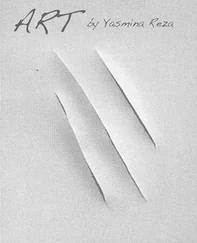She gripped my wrist in a show of complicity. “One of these days I’ll have to do a readjustment on your aura.”
“What does that mean?”
“I’ll check you out with my crystal. Clear whatever’s clogged, cleanse the organs. Restore the flow.”
“That’ll take years.”
She laughed and disappeared into the stairwell,
shaking her orange hairdo.
* * *
More on the curtains: my friend in early adolescence (before my Denner years) was named Joelle. She was beautiful and funny. We were never an inch apart, day or night. Her family was even crazier than mine. Among all kinds of nutty stuff we used to do oil paintings—I still have a few of them, overloaded with gunk—we wrote songs, stories, we lived in Pataugas boots and boys’ sweaters, it was the beatnik period. Myself, I never did more than grass and a little alcohol, Joelle got into acid and other freak-out things, and our friendship began to fall apart. One year she came back from Asia by air ambulance, she had taken some hallucinogenic mushroom that unhinged her. She’d just turned eighteen. Twenty years later she telephoned me. She’d found me through my sister on Facebook. I went to see her in Aubervilliers, in a flat that looked out on an interior courtyard. Joelle was just back from the Antilles with a child by a Martiniquais guy who took off into the bush. She had gotten a nursing certificate, she was looking for work. They were living in two connected rooms, an entry hall with a table in it and a bedroom. Dark rooms, made still darker by faded curtains. While it was still late daytime Joelle lit a lamp. We sat talking in that mixture of daylight and electric light that brings back the oppressive atmosphere of Sundays. Sunday was the only day in our house when we could relax about saving electricity, normally we had to turn out the lights in a room even before we left it. Jeanne and I had got used to living in darkness, I much preferred an un-sad darkness to this lugubrious combination. Joelle made me tea, I watched her sitting there with her anxious little boy against the yellowish background. I thought, We’re not going to get anywhere. I left at the end of the afternoon, abandoning her for the second time in my life.
* * *
An hour before the party things were pretty much under control, the platters filled, the quiches ready for the oven. Pierre would take care of the salads. On the clothing front, two outfits had been set out for a few days now in the full understanding that in the end I would wind up putting on the no-problem no-risk black dress. I swallowed a Xanax and went to pretty up with a new anti-aging product prescribed by Gwyneth Paltrow. Intellectually I disapprove of the term “anti-aging,” which I find guilt-inducing and dumb, but another part of my brain buys into the therapeutic terminology. I recently ordered Cate Blanchett’s favorite cream over the Internet, on the claim that every stylish Australian carried it in her purse. There must be something a little wrong with me. On the radio people talked about the psychological fatigue of the French people. Despite the vagueness of the idea, I was pleased to learn that the French were in the same condition I am. The French had definitively lost their sense of safety. The same old song again. Who can call themselves safe? Everything’s uncertain. It’s the basic condition of life. On top of that, over the air they were saying people are alarmed about the weakening of the social bond. Neoliberalism and globalization—those two calamities—are apparently obstructing the creation of bonds. I thought to myself, You’re creating a social bond tonight in your apartment in Deuil-l’Alouette. You’re lighting candles, you’re plumping cushions for your guests, you put the onion tarts in the fridge and you’re applying your face cream with circular upward motions as prescribed. You’re giving a little touch of youth to existence. A woman is supposed to be cheerful. Unlike a man, who is entitled to spleen and melancholy. After a certain age a woman is condemned to good spirits. When you sulk at twenty it’s sexy, when you do it at sixty it’s a drag. They didn’t say “create a social bond” when I was young, I don’t know when that phrase—in the singular—dates from. Nor what it means: the bond reduced to its abstract form has no virtue in itself. Another one of those hollow expressions.
* * *
My mother died ten days ago. I didn’t see a lot of her, the death doesn’t change much in my life except that somewhere on earth there used to exist my mother. Yesterday I had a visit from the home health aide who had taken care of her through the last period, and whom I owed money. A huge woman who always scared me and who pants when she talks. She had heard about the drama in our building and was obviously hungry for the details. Disappointed at my reticence, and all the while munching on a St Michel cookie, she switched to the story of a woman baker in Vitrolles who had killed her children on Christmas Eve. In the nighttime she had wrapped the gifts, set them beneath the tree, then went into her son’s room and pressed the pillow over his face till he smothered. Then she went to the daughter’s room and did exactly the same thing. The aide said, “She wraps the presents, puts them under the tree, and she goes right upstairs and kills the kids.” She said, “What I don’t like is, they tell you all that and then afterward it’s total silence. You hear the story over all the radio stations and then zero. They lure you in and then they slam the door in your face. The wars, the massacres, all that’s too global,” she said, picking up another cookie. “To me, the global stuff, that doesn’t do much for me. It doesn’t take me out of myself. A story from regular life, yes. It fills out the day. People talk about it. You don’t think about your own problems anymore. I’m not saying it’s consoling, but in a way yes. Like, why did she put the presents under the tree, in your opinion? I got along real well with your momma, she was so nice that lady!”
“Yes, yes.”
“A nice lady. And nice with everybody.”
“I should let you go, Madame Anicé, I’ve got a job to finish . . .”
She rearranged the waistline of her T-shirt, whose print reminded me of the Formica countertop patterns from the 1960s, and slowly got to her feet. “I’ve got a theory on the Christmas presents . . .” In Ginette Anicé’s physical person, just two elements reveal an interest in self-presentation: earrings—two gold studs of the sort used to cover the puncture, and the spit curls along her forehead. Her hair is short all over except for some length at the forehead, inch-long extensions, enough to allow the fingers to shape little ringlets . . . They’re barely noticeable, it takes someone like me who’s alert to hairdos to see them. They run along the top rim of the forehead at regular intervals, but make no mistake, they’re not just some natural curly border, this is bangs worked into separate locks, with decorative intent; they’re actual spit curls.
“My theory,” said Ginette, “is that it just hit her while she was busy doing the presents. It was life-fatigue that hit her.”
“That could be . . .”
She picked up her felt coat.
“Madame Anicé, would you like to have a crocheted pillow cover?”
“Ah, those covers your momma used to make . . . That’s kind but I don’t have any cushions at home.”
“Or maybe a doily for the back of the chair?”
“A doily, as a keepsake—sure! . . . And that there, that’s the picture that was in your momma’s bedroom!”
It annoyed me that she kept saying “your momma. ” I can’t stand those infantilizing expressions. She was talking about a picture of (our son) Emmanuel at La Seyne-sur-Mer. My mother kept that photo in a frame on her night table. A picture of her grandson at twelve, in a bathing suit with a sun hat. She also had an old birthday picture of Jeanne’s children. I always wondered what those pictures meant to her, I mean emotionally. In my view, she didn’t see them, those frames were set beside her bed by convention. We live under the rule of convention. We run on rails. Before she left, Ginette Anicé announced that she had quit the health agency and only wanted to work private home-care jobs. So actually she was unemployed. I said I would ask around, when in fact I would never recommend her to anyone. I closed the door behind her and looked at the photo. I looked at Emmanuel’s little body. His skinny arms. He was the busiest child on the beach. Always with a bucket in hand, carrying it empty or full, going from the water to the brush at the end of the sand to build who knows what miniature world, back and forth dozens of times, looking for stones, chunks of wood, shells, all kinds of creatures in the foam. When he went into the water, it was never to swim. Standing in the water up to his waist, he would say, “Momma, tell me who you want to see die?” I would say the name of one of his teachers at school (that was the game).
Читать дальше

![Ясмина Сапфир - Охотница и чудовище [СИ]](/books/35157/yasmina-sapfir-ohotnica-i-chudoviche-si-thumb.webp)
![Ясмина Реза - Бог резни [=Бог войны]](/books/63616/yasmina-reza-bog-rezni-bog-vojny-thumb.webp)
![Ясмина Реза - Бог войны [=Бог резни]](/books/63617/yasmina-reza-bog-vojny-bog-rezni-thumb.webp)








